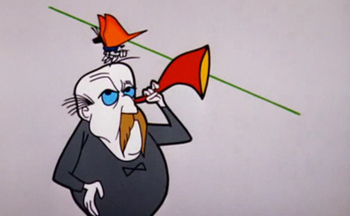
"Now Hear This" is a 1963 Looney Tunes cartoon, co-directed by Chuck Jones and Maurice Noble.
This cartoon short does not look very much like classic Looney Tunes animation, instead more closely resembling the abstract animation and limited animation that was coming to dominate the art form in the early 1960s. It opens with Satan wandering around, having lost one of his horns. The horn is found by a mustachioed English gentleman who uses a battered ear trumpet. The man likes the look of the shiny horn and elects to use it instead, throwing his battered ear trumpet into the garbage. A series of bizarre and fantastical hallucinations then occur, as the sounds the man hears are greatly magnified and distorted, and they take visual form. Additionally a weird mischievous small man springs from the horn and starts screwing with the gentleman.
Not to be confused with "Now Hare This", a Looney Tunes cartoon featuring Bugs Bunny.
"Now Hear This" provides examples of:
- Animated Credits Opening: Sure, it's a cartoon to begin with—but in the classic Looney Tunes era the title and credits were usually presented with a still title card. Chuck Jones's credit is presented on a sailing ship that has "Directed by Chuck Jones" written on it. The other credits appear first as letters on musical lines that suggest a written score (mostly notes like E and F), until all the other letters fill in.
- The Artifact: The new Looney Tunes opening and closing was made specifically for this short, with the chimes of Big Ben at the end recognizing the short's setting in London. However, it would be used again in two cartoons, Bartholomew Versus the Wheel (which is about a dog trying to get back to his home in America) and Señorella and the Glass Huarache (which is Cinderella with a Mexican theme), retaining the Big Ben chimes. It is played even further when this becomes the permanent intro for the series, but the Big Ben chimes were dropped.
- Big Red Devil: Satan appears as his classic red-hoofed self, minus a horn.
- British Stuffiness: The gentleman has the walrus mustache, he reacts with horror and confusion to all the craziness, and there's a trash can marked "Keep Britain Tidy", as well as some snatches of "Rule Britannia".
- Deranged Animation: All kinds of crazy things happen in a manner reminiscent of Duck Amuck. In one sequence the horn starts to ring. The small man pulls a phone set out of the horn, dashes over to a phone booth, and hangs the set. Since the phone is still ringing the gentleman goes over to the phone booth—which then turns into a shower stall, with the phone receiver turning into a shower head, soaking the man.
- Disney Acid Sequence: Some very trippy, hallucinatory animation.
- Ear Trumpet: The old man uses one. He trades it out for a new one that he finds. It turns out to be a mistake.
- Later-Installment Weirdness: For starters, there's all the Limited Animation and Thick-Line Animation that's atypical of the Warner Bros. cartoons. This is also the first cartoon to use the new opening and closing logos, with the trippy spiraling animation and the distorted theme song, as opposed to the classic bull's-eye graphic. This new graphic would be used again in Bartholomew Versus the Wheel and Señorella and the Glass Huarache and then be adopted permanently in 1964 and serve as the opening to every Looney Tunes short churned out in its
 post-1964 era (particularly the DePatie-Freleng-produced cartoons pairing Daffy Duck with Speedy Gonzales and Rudy Larriva's Road Runner cartoons) until the Warner animation studio was closed for good in 1969.
post-1964 era (particularly the DePatie-Freleng-produced cartoons pairing Daffy Duck with Speedy Gonzales and Rudy Larriva's Road Runner cartoons) until the Warner animation studio was closed for good in 1969. - Limited Animation: This cartoon was probably Chuck Jones trying to make a silk purse out of the sow's ear that was Warner Brothers drastically cutting their animation budget as The Dark Age of Animation was beginning. But the entire cartoon is abstract animation against a white background in a manner that was much different from most Looney Tunes output. A few years after he was fired by WB, Jones would explore limited animation even further with MGM's The Dot and the Line.
- Mime and Music-Only Cartoon: No dialogue other than an "Ow!" as the O-W in "Now Hear This" appears, as well as a later "Quiet!"
- Powder Trail: A surreal example for a surreal cartoon. The horn starts playing music, which unspools as written sheet music, a staff with notes. The ribbon of staff then wraps around the gentleman. The small man then holds a match to the end of the ribbon, and the notes start going off like firecrackers one at a time, until they reach the man and there's a "GIGANTIC EXPLOSION".
- Recycled Soundtrack: In addition to a few new Bill Lava compositions, the cartoon also makes use of some older musical score snippets in Warner Bros. Pictures's archives, such as the arrangements of Rue Britannia.
- Spoof Aesop: The small man closes out the cartoon with a sign announcing the moral: "The other fellow's trumpet always looks greener."
- That Poor Cat: When the old man tosses his old crumpled Ear Trumpet into a "Keep Britain Tidy" trash can, among all the crashing that ensues a cat yowling can be heard.
- Thick-Line Animation: Another trope characteristic of the Limited Animation era but not of classic Looney Tunes. All the characters are drawn with thick black lines, Satan standing out the most.
- Written Sound Effect: The explosion that finally leads the man to throw down the horn in disgust is accompanied by a graphic that says "GIGANTIC EXPLOSION!"
